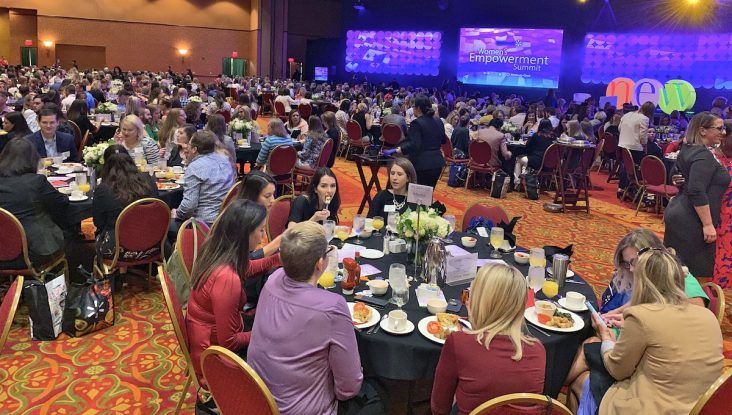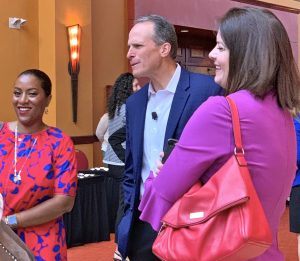‘Drive-On’ pushed as a message for women seeking parity in business, sports
by June 27, 2019 5:28 pm 964 views

More than 800 female professionals and a sprinkling of male supporters took part in the Northwest Arkansas Women’s Empowerment Summit at John Q. Hammons Center in Rogers on Thursday (June 27).
More than 800 women and a few men packed the grand ballroom of John Q. Hammons Center in Rogers on Thursday, (June 27) to celebrate women’s empowerment in conjunction with the Walmart NW Arkansas Championship, a sanctioned LPGA Tour event.
Diana Marshall, vice president of sports and outdoors for Walmart U.S., opened the event noting it was a record attendance and marked the 15th anniversary for the local chapter of Network of Executive Women (NEW). NEW planned and hosted the event with the help of Walmart, Kimberly Clark and 33 other sponsors – double the number from last year.
Stacy Lewis, a 12-time winner on the LPGA Tour and former NCAA individual champion at the University of Arkansas, was one of the featured speakers. She joked despite the well-dressed looks of the crowd, there is a women’s golf tournament being played nearby. Lewis, a new mom, said she’s excited to be back competing in Northwest Arkansas. Lewis said being able to take her 8-month-old daughter on the road is part of the reason she returned to playing soon after the birth.
“We have daycare at the LPGA and my daughter travels with me, even internationally,” Lewis said.
Roberta Bowman, chief brand and communications officer for the LPGA Tour, and a keynote speaker, said holding women’s empowerment summits in conjunction with LPGA tournaments are a great way to promote the sport that, despite popularity with consumers, still lags media coverage and corporate investments relative to men’s sports.
Bowman recently ended nine months of retirement as chief sustainability officer from Duke Energy to join the LPGA Tour staff. Bowman said she was blessed to have jobs that allowed her to make a difference.
“Try explaining to your 90-year-old mother your job as chief sustainability officer … My sister was in the medical field and my brother in business and my mom told her friends her youngest daughter was a chief suppository officer. You can’t make this stuff up,” Bowman joked.
Her message centered around the “Drive-On” campaign saying being a driver is about leading change and pushing through the clutter toward the end goal, whatever that may be.
WORKING THE ‘ASK’ MUSCLE
Sarah Thomas, the first female referee in the National Football League, has overcome obstacles. Thomas said her life didn’t begin April 8, 2015, but she spent 24 years facing obstacles to lead up to the point where she could be an NFL official. Thomas turned to officiating to stay around sports and spent 10 years officiating high school games. She made it to the NCAA level in 2007 and was recommended for the NFL in 2013 after her third child was born at the end of 2012. She said in 2014 she was never called, but on April 8, 2015, she got a call from the NFL welcoming her as an official. She just finished her fourth year officiating in the NFL.

“Don’t do it because you are trying to prove other people wrong, that list of people will never end. Do it for yourself and because you love and deserve it,” Thomas told the group.
Cheryl Grace, an executive with Nielsen, spoke briefly on why women don’t get what men do many times. She said women simply don’t ask for what they need. She said a study by Harvard Business Review found 57% of men asked for higher salaries during negotiations, but only 7% of women did. She said men are primed to negotiate from an early age, whereas women are apt to expect others to know what they want.
She said women also need to avoid making assumptions and talking themselves out of asking for what they want because they assume they won’t get it. Grace challenged women to flex their “ask muscles” and start negotiating for things they want. The movement is #OhYesHoneyIAmAsking. Grace encouraged the women to flex their ask muscles then share the results with her on LinkedIn with the #OhYesHoneyIAmAsking hashtag.
MEN SPEAKING UP
Andy Dunn, CEO of Walmart-owned Bonobos, said he has often been on the wrong side of the argument surrounding women’s empowerment, not by intention but from lack of awareness. His wife is his compass for the issue and Dunn said he appreciates when women stand up to unconscious bias in the workplace. He shared a story about a valued employee who was afraid to tell him she was expecting a baby and would need to take several months off. Dunn said he was flabbergasted she would be scared to tell him such wonderful news.
“How have we created a world like this?” Dunn said. “I encouraged her to take the time off and I promoted her before she took the time, so everyone in the company could see her work was valued and appreciated and we supported her decision to take time off. I hope that means she will come back to us when she’s ready.”
Steve Bratspies, chief merchandising officer at Walmart U.S., also spoke about unconscious gender bias. He said the company has made progress but is nowhere near finished. He said 33% of the company’s officers are women and 43% of the promotions last year went to women, but that’s not enough. He said women are under-represented in executive roles across all the Fortune 500 companies, including Walmart. Bratspies said men can become paralyzed by unconscious bias which has to be unraveled. He said that doesn’t get done unless difficult conversations take place.
Bratspies said he wanted to survey his team ahead of the event about bias they see in the workplace. However, he said legal and HR didn’t approve the exercise because they weren’t comfortable with what it might reveal.
“We have to find the courage to be vulnerable as companies to have the tough dialogues to get down to the root of unconscious bias and other issues of inequality or real parity will never happen,” Bratpsies said.
‘HUMANNESS MATTERS’
Beth Shelton, director of the Girl Scouts of Iowa, also spoke at the event. She said her organization has adopted benefits for employees that push the bar for other businesses and nonprofits to also consider. Shelton said her organization adopted a bring your baby to work policy, after much discussion and planning and an about-face from her on the topic. She said they didn’t just try it. They embarked on a full-blown exercise and weeks of discussion of pros and cons that resulted in a 10-page business addendum that others can adopt.
“We also added a caregiver benefit to employees that allows for 4 paid weeks off to care for a loved one with an acute physical or mental need,” Shelton said. “These improvements in benefits have helped increase our productivity with a revenue bump of 21% in the last three years, and it’s helped with talent acquisition. We recently just posted a job, the salary was $45,000. We posted it on Friday and by Monday we had more than 200 applications. The majority of them were from people with other nonprofits who said they wanted to work for an organization who valued its people. That just goes to show humanness matters.”
Kim Underhill, group president for Kimberly Clark consumer business in North America, talked to Talk Businesses & Politics prior to the event. Underhill runs an $8 billion business at Kimberly Clark, a position she’s held for about a year. Underhill has logged 31 years at Kimberly Clark and said the company has made big strides in promoting women.
A few years ago, Underhill said she was the only woman working on the feminine care team. She said there is no way men, no matter how great they are, can know what female consumers want in a feminine care product.
Underhill said many of the products Kimberly Clark makes, from Huggies to Kotex, Depends and Cottonelle, are typically purchased by women. She said having more females in executive roles makes sense from a business perspective as they bring a diversity of thought and can also personally relate to many of the KC product lines.
“I am proud that now over half of my leadership team are women today, not because we are trying to meet a quota, but because they deserve to be there. Three of my four business units today are run by women. My entire team is here today, even the men because they need to see how important this is in the leadership process to understand unconscious bias and manage through it,” Underhill said.
